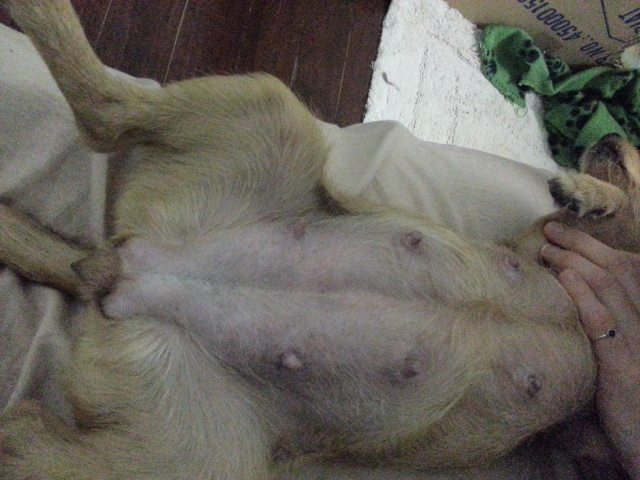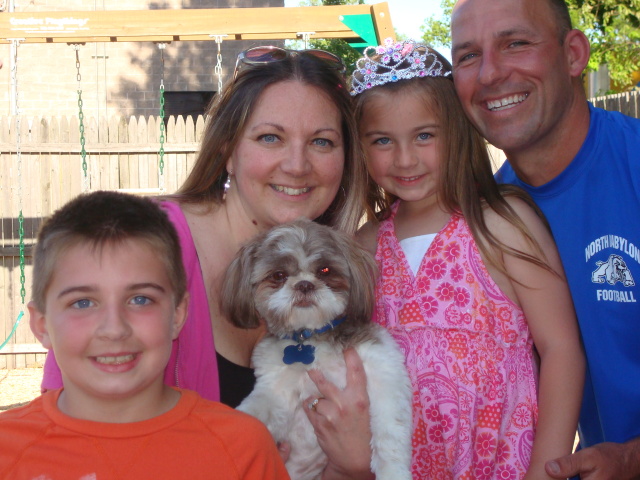QuestionOur 8 yr old lab/shepard mix has been our best friend since he was about 6 weeks old. He's been with us through the death of my husband, remarriage, birth of my daughter, and most recently, our son's 10th birthday this July.
Today, he bit our 2 year old daughter on the arm, not leaving any lingering mark, but this is the second time this summer he's bit someone. Although we have been striving to make his life enjoyable and comfortable since the first time, this is the point of no return, so to speak. We can't have an 80lb dog in the house that is aggressive toward our children. NOTE that this is NOT a question about aggression.
What are our options? Is there any group that finds homes for older dogs? Does he have to be put down? I can't bear the thought of him spending his final years tied outside, and I simply won't put him through that, but he can't stay in our house any longer.
Any advice you could give would be helpful during this heartbreaking time.
AnswerHi Melanie,
If your dog has never bitten until this summer, you should have him examined by your vet. There are lots of reasons why an older dog would have a change of personality, and the dog may be able to be treated. The most common hidden cause of aggression in older dogs is the onset of arthritis. If arthritis is causing a dog pain, it can lash at it's human family, or other dogs.
Is it possible to keep your dog crated when you can't be supervising him, rather than leaving him alone with your small child? Another option would be to contact a professional trainer or behaviorist for evaluation and maybe your dog can be rehabilitated.
Most breed rescue groups don't take dogs with a history of biting, though you should certainly contact whatever Lab or Shepard breed rescues are in your area. Most breed specific groups take mixed breeds, as long as the dog is part of their specific breed. There are also rescue groups that aren't breed specific. Try doing a google search for rescue groups near your area.
Your best bet for rehoming your dog would be to advertise for a new home. Be sure to stress that your dog needs a home without small children.
Don't place any ad's for a "free to a good home"! Set an adoption fee. You can't expect the new owner to pay the same price for an older dog as they would for a brand new puppy - but a small fee helps to ensure that they are really ready for the cost of dog ownership.
A reasonable range might be between $50-150, which helps offset your advertising costs. If they aren't willing to pay an adoption fee or complain that it is to high - will they spend the necessary dollars if the dog has a minor injury or illness?
Don't be afraid to use classified ads to advertise your dog, flyers in local stores, at your vet's office, or several web sites with various rescue groups. Two good web sites are the classified section of www.petfinders.com, and craigslist.org. Both are free.
You are under no obligation to give your dog to the first person who says he wants him or her. You have every right to ask questions and choose the person you think will make the best new owner.
Make sure all people in the home are in agreement with a dog coming into their home. If the potential adopter is renting be sure the landlord/apartment complex allows pets (confirm with the landlord/manager) - especially of a certain size/breed.
Get the phone number of their vet (if they've had pets before) and three other personal references. Call those references! Explain that John Doe is interested in adopting your dog and you want to verify care, annual vaccinations and heartworm preventative.
Once you've chosen a family (or families) that you feel are good candidates, make an appointment for them to see the dog, and one for you to see their home.
There are some things you need to explain to the new family before they take your dog home: The dog will go through an adjustment period as he gets to know his new people, learns new rules and mourns the loss of his old family. Most dogs adjust within a few days, but others may take longer. During this time, the new family should avoid forcing the dog to do anything stressful - taking a bath, obedience training classes, meeting too many strangers at once, etc. - until he's had a chance to settle in. Tell them to take things easy at first and give the dog time to bond to them. The dog might not eat for the first day or two. Not to worry - he'll eat when he's ready. Some dogs temporarily forget their training. A well-housebroken dog may have an accident during the first day in his new home. This isn't unusual and rarely happens more than once.
When you've found the right adopter, have them sign a contract, such as this one: http://www.anewleashonlifedogrescue.org/samplekt.html
A last resort would be surrendering your dog to a shelter. There are "No Kill Shelters", but that's something of a misnomer. "No-kill" is defined as not having to euthanize animals unless they are deemed to be extremely aggressive and violent or animals that are in such poor health that it would be seen as inhumane to force them to continue to live. A shelter is a stressful place for a dog. That said, here are sites which list No Kill Shelters:
http://www.saveourstrays.com/no-kill.htm
http://www.happyhippie.com/nokill.htm
http://www.nokillnetwork.org/
Best of luck,
Patti

 high temp tummy
Question
swollen nipples?
My two year old Jack R
high temp tummy
Question
swollen nipples?
My two year old Jack R
 2 Year Old Dachshund Rescued From Probable Bad Situation
Question
Nelson Nelson
Hi there! I recentl
2 Year Old Dachshund Rescued From Probable Bad Situation
Question
Nelson Nelson
Hi there! I recentl
 TRAINING POMERANIANS
Question
chichi&coco
I have two Pomeranian-mixed do
TRAINING POMERANIANS
Question
chichi&coco
I have two Pomeranian-mixed do
 what is my dog????
Question
Connie
Patti, i got my dog Connie a few months
what is my dog????
Question
Connie
Patti, i got my dog Connie a few months
 18month old sweet shih tzu starting to growl at me
Question
our family
Hi Valentina,
I have recently beco
18month old sweet shih tzu starting to growl at me
Question
our family
Hi Valentina,
I have recently beco